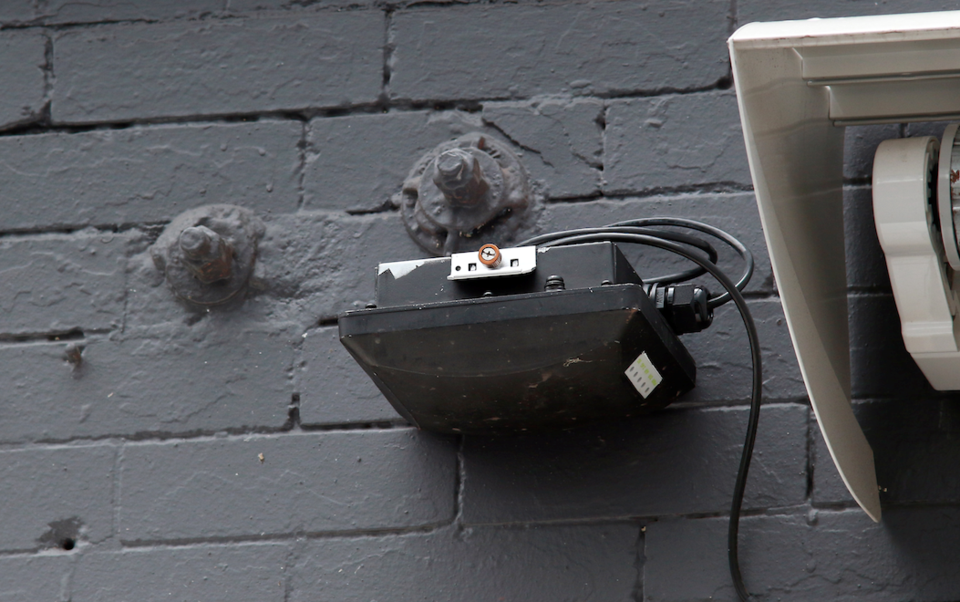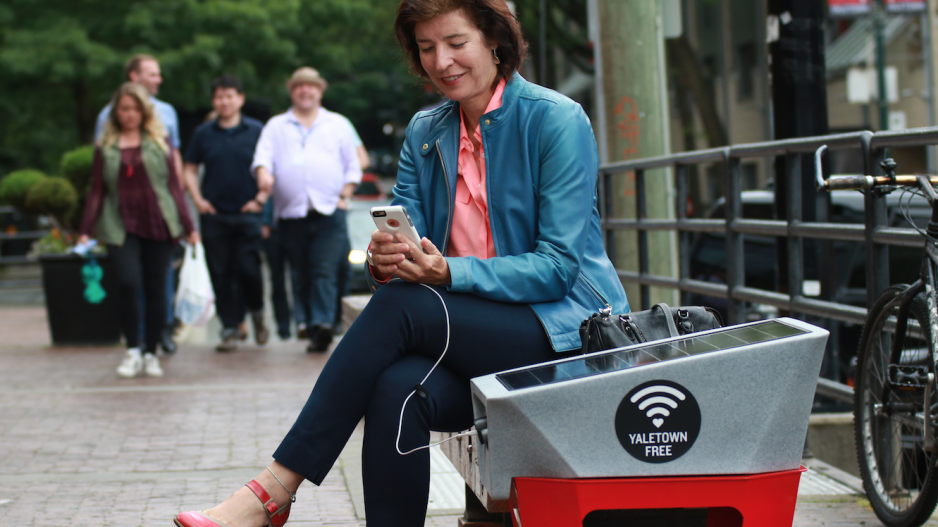Powerful free Wi-Fi is up and running on Mainland Street in Yaletown, and the area’s business improvement association expects to triple the range of the service by the end of summer – without the help of the City of Vancouver or any telecom partner.
Seven routers provide coverage along Mainland Street between Davie Street and nearly to Smithe Street in the touristy downtown district.
Construction of similar coverage along parallel blocks of Hamilton Street, one street west, will start next week with further coverage along Homer Street likely by late September, Yaletown Business Improvement Association (YBIA) executive director Annette O’Shea told Business in Vancouver.
She expects that the entire rollout for five years will cost $60,000, which will be borne by the association’s 900 members, who unanimously support the initiative.
The cost translates into about $66.66 per member, or about $1.11 per month.
“The cost is negligible,” said Opus Hotel general manager Nicholas Gandossi, who sees the initiative as providing a competitive advantage.
Many tourists switch off the roaming capability on their phones when visiting Vancouver because of what they see as high telecom fees for that service, he said. The result is that they are unable to walk out of their hotel and onto a nearby street while using their smartphone for navigation, to check email or to chat with friends on social media apps.
Having Wi-Fi in Yaletown will change that, Gandossi said, adding that the service could prompt visitors who might otherwise have stayed at a Coal Harbour or Robson Street hotel to choose Yaletown instead.
The Wi-Fi is a strong signal but it is supposed to be engineered so that the device using the signal must be within the line of sight of the router. As such, the signal is unlikely to be able to be accessed within businesses' walls.
Swirl Wine Store owner Jeff Wong said tourists could choose to hang out in Yaletown simply because of the free Wi-Fi, and that this added traffic would only help his wine sales.
Other business improvement associations, such as the Robson Street Business Association (RSBA), looked at the idea of installing Wi-Fi but the cost deterred them.
The RSBA has a smaller, 180-business membership, so members would have to ante up more than what their counterparts in Yaletown pay, said RSBA executive director Teri Smith.
“The City of Vancouver should be investing in some of their more prominent areas as part of their tourism strategy, or Tourism Vancouver should [be investing],” she said.
The larger Downtown Vancouver Business Improvement Association has similarly deferred installing Wi-Fi until it gets help from the city.

(Image: Part of the cost efficiency of the free Yaletown Wi-Fi project came because building owners agreed to allow routers to be permanently affixed to the buildings | Rob Kruyt)
Coun. Melissa De Genova told BIV that she has long advocated that the city front part of the bill to get Wi-Fi on high-traffic tourist streets.
“I wouldn’t support the City of Vancouver bearing the brunt of the entire cost, but the city should be involved in this,” she said.
The city partnered with Telus Corp. (TSX:T) to provide free Wi-Fi at 34 city-owned sites, such as community centres, theatres, public pools and golf courses. Nine more such installations are slated although none of these are on public streets.
Free Wi-Fi on streets could be part of a Phase 2 rollout, according to the city.
Free Wi-Fi at city-owned sites often do not require users to provide email addresses or even to accept terms and conditions although O’Shea said that this requirement was in place at at least some of the sites when the free Wi-Fi launched.
She said that she approached Telus and other telecoms after the city’s free Wi-Fi program wasa in place but they would not agree to provide free Wi-Fi to the YBIA unless they could collect data from users.
In the end, the YBIA contracted with U.S.-based router-maker Ruckus (NYSE:RKUS), which subcontracted Shaw (TSX:SJR.B) to provide the connection.
To get access to the free Wi-Fi, users must choose the Yaletown Free Wifi network on their device, then open a browser window to agree to the terms and conditions, which are similar to those set by Starbucks (Nasdaq:SBUX) and BC Ferries, O’Shea said.
“We didn’t want to force people to provide data,” she said. “When I was in New York, I had to give them my email address every time I used the free Wi-Fi. I would leave New York and get home and get emails from them. I thought, ‘I’m not even in your city anymore.’”
The YBIA is also now providing a free solar-powered charging station so people can charge mobile phones.•




